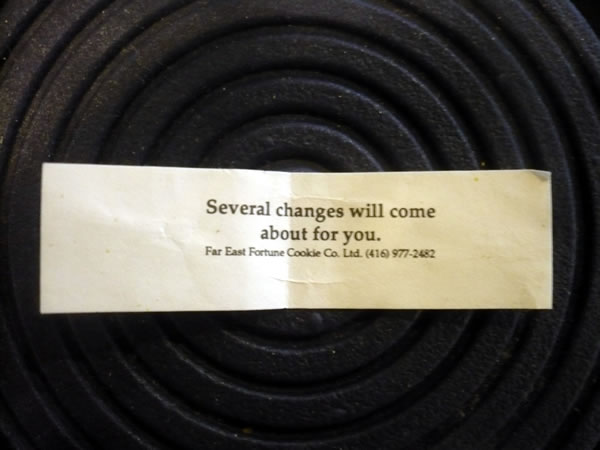
An apt metaphor for the new job.
As promised, I am announcing my new job today. But not here: you’ll have to go to Global Nerdy to find out what it is.

An apt metaphor for the new job.
As promised, I am announcing my new job today. But not here: you’ll have to go to Global Nerdy to find out what it is.

The new look on my tech blog, Global Nerdy, is just the tip of the iceberg. Big changes are in store for both the blog and its author, Yours Truly. It’ll all be made clear in a post tomorrow, which will include an update on my employment situation.

Since getting laid off, I’ve been getting a little less exercise. My bike commute to work, a 14-kilometre (8.7 mile) round trip, is gone. I also haven’t been going to the gym as often, even with the extra free time. I’ve lost five pounds since getting called into my layoff meeting two weeks and two days ago, in spite of the reduced exercise and some pretty big meals, including an anniversary dinner, Wendy’s birthday dinner and the farewell dinner b5 threw earlier this week. I needed to shed that weight anyway; I should make sure not to gain it back once I land a job.
Should you lose your job, your mileage may vary depending on how you respond to stress. I’ve been waking up about an hour earlier than normal to work on my career plans, research the companies who’ve shown an interest in me, and to do a little extra work on some blog entries. I also haven’t felt like eating as much, which comes from feeling twitchy about the situation. If your response to stress is to eat more or drink lots of beer (a.k.a. “liquid bread”), the change in your weight is likely to be the opposite of mine.
[This article also appears in Global Nerdy.]

Because I was laid off and not fired from my former place of employment, they’re taking me out for a farewell dinner on Tuesday night. It’s a nice gesture on their part, and I appreciate it greatly.
I’m allowed to choose the restaurant, and I must let them know my choice by Monday, October 6th. The problem is that I’ve just got too much on the brain and need help picking a place. If you’ve got suggestions, I’d like to hear them!
Some parameters:
[This article was also published in Global Nerdy.]

Technology, media and pop culture writer Douglas Rushkoff, who’s got a guest writing slot at the uber-blog Boing Boing, points to an essay titled Riding Out the Credit Collapse. Published in the spring 2008 edition of Arthur magazine, it:
Don’t let the article’s apparent length scare you off — read it! Yes, it’s ten screens, but it’s set in a narrow column. If you’re still skittish about reading that much, shame on you, and here’s the part on which I want to focus:
Whatever the case, the best thing you can do to protect yourself and your interests is to make friends. The more we are willing to do for each other on our own terms and for compensation that doesn’t necessarily involve the until-recently-almighty dollar, the less vulnerable we are to the movements of markets that, quite frankly, have nothing to do with us.
If you’re sourcing your garlic from your neighbor over the hill instead of the Big Ag conglomerate over the ocean, then shifts in the exchange rate won’t matter much. If you’re using a local currency to pay your mechanic to adjust your brakes, or your chiropractor to adjust your back, then a global liquidity crisis won’t affect your ability to pay for either. If you move to a place because you’re looking for smart people instead of a smart real estate investment, you’re less likely to be suckered by high costs of a “hot” city or neighborhood, and more likely to find the kinds of people willing to serve as a social network, if for no other reason than they’re less busy servicing their mortgages.
I think Rushkoff’s got the right idea, and I’d like to torque it a little further. Forget for a moment the more fanciful ideas of printing your own “Canadian Tire Money”; when he says “local currency”, I want you think of these things:
Among the many things that I’m churning in my brain right now — along with updating the resume, finding a place to put all the stuff that I used to keep at the office and getting that eye appointment with Dr. Heeney before my work-provided insurance coverage expires — is real-world testing an idea and writing about it here. That idea rests on two principles, namely:
Watch this space, ’cause I’m going to expand on those ideas!

Yearly statistics for the
StatCounter says that sometime within the half-hour before I wrote this, The Adventures of Accordion Guy in the 21st Century got its 2 millionth page view for 2008. My thanks to all of you for making this possible!
Hey, web advertisers! I get 100K pageviews/month and in the Technorati 5K. I can get you clicks! Email me at joey@joeydevilla.com and let’s see what I can do for you!
Hey, tech companies! Looking for a Guy Kawasaki or Robert Scoble, but who can also code? Think of me as the budget version of those guys. Or better yet, think of Guy Kawasaki and Robert Scoble as overpriced Joey deVillas. Once again, email me at joey@joeydevilla.com and let’s see what I can do to put you on top!
I found this while cleaning out receipts from my wallet. It’s from my last fortune cookie:
